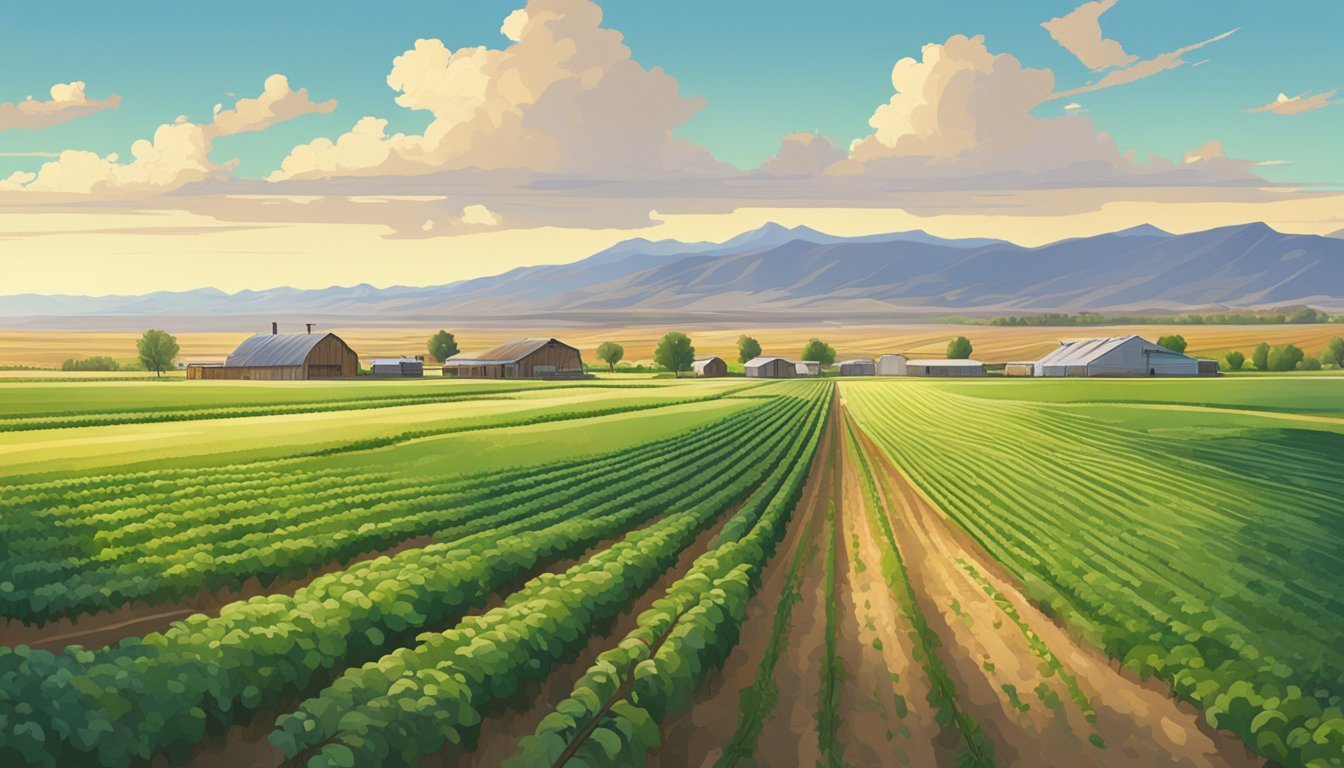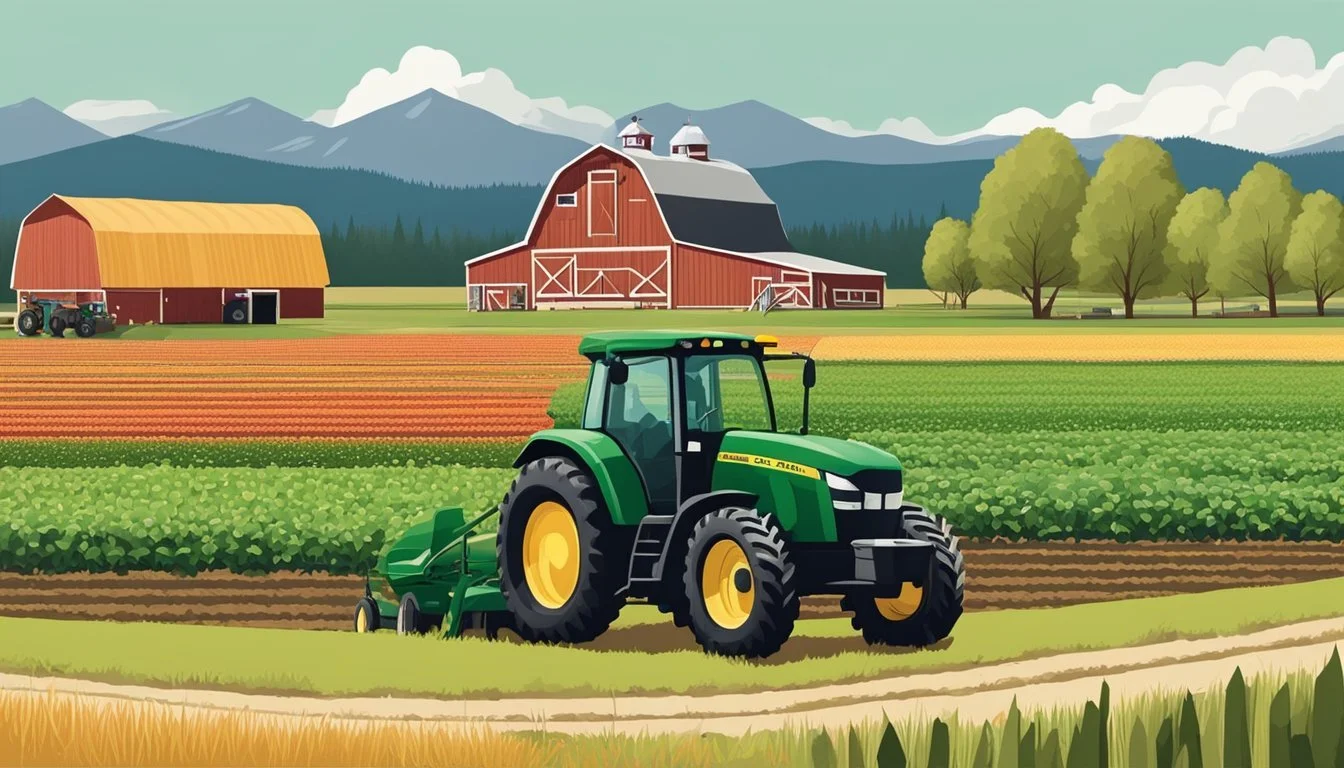Guide to Farming in Colorado
Essential Tips for Successful Harvests
This Article is Part of Our State by State Farming Guide
Colorado's varied landscape and climate present a unique environment for agriculture, which plays a significant role in the state's economy. The average farm in Colorado encompasses 815 acres, with cattle and calf rearing being the most prevalent agricultural activity. Colorado agriculture is diverse, contributing significantly with products ranging from dairy, corn, hay, and wheat. Moreover, the state stands prominently in the production of hogs, potatoes, proso millet, floriculture, and chicken eggs.
Agriculture in Colorado benefits from the collaborative efforts of various organizations providing resources and support to new and established farmers and ranchers. These entities offer research-based information and guidance on a wide array of topics, including crop production, farm management, and livestock rearing, suitable for the different geographical areas within the state, from the plains to the mountains.
Farming in Colorado also rides the wave of evolving agricultural practices, adapting to the challenges and rewards of the modern age. Aspiring and current producers are encouraged to participate in state-run programs such as the Farm Fresh Directory to enhance their reach within the industry. In doing so, Colorado maintains its reputation for high-quality agricultural goods and continues to foster growth and innovation within its farming communities.
Colorado's Agricultural Landscape
Colorado's agricultural strength stems from its diverse geography and climate, which have shaped its farming practices and production. With vital regions like the plains, the mountains, and the Western Slope, the state boasts a rich mosaic of crops and livestock.
Geography and Climate Influence on Farming
Colorado's agriculture is markedly influenced by its topography and climate. The Eastern Plains region, characterized by its flatter terrain, is conducive to large-scale farming and livestock ranching. In contrast, the Western Slope provides a more varied landscape that supports a mix of agricultural activities. The Rocky Mountains, intersecting the state, present both challenges and opportunities for high-altitude farming.
Colorado’s climate can be complex with temperature extremes and varying precipitation patterns that directly affect farming. The area experiences a semi-arid climate, featuring cold winters and hot summers which necessitates careful water management and soil conservation practices.
Key Crops and Livestock
The major crops and livestock that define Colorado's agricultural identity are diverse, reflecting the state's unique farming zones. Here is a closer look:
Crops:
Grains: Colorado produces significant amounts of wheat and millet.
Hay and Alfalfa: These are crucial for supporting livestock and are widely cultivated.
Corn: A vital grain crop for both human consumption and feed.
Potatoes: Grown particularly in the San Luis Valley.
Peaches: Favored by the climate of Palisade and the surrounding areas on the Western Slope.
Vegetables and Specialty Crops: Include onions and lettuce, with many grown in the Arkansas Valley.
Livestock:
Cattle: A cornerstone of Colorado's livestock sector, especially in the plains.
Sheep: Representing a significant portion of the state’s agricultural income.
The synergy between these components directly impacts the success and sustainability of farming in Colorado, with each region specializing in products suited to its environmental conditions.
Agricultural Practices and Farm Management
Colorado stands as a beacon of varied agricultural practices, supported by robust research and education efforts. Colorado farmers and ranchers are equipped with tools and knowledge to facilitate efficient farm management and land stewardship.
Sustainable Farming Techniques
In Colorado, sustainable farming techniques are essential to ensuring the longevity of the agriculture industry. Farmers and ranchers employ methods to maintain soil health, optimize water use, and reduce chemical inputs. These techniques include crop rotation, conservation tillage, and integrated pest management to protect both the environment and natural resources.
Crop Rotation: Alternating crops to prevent soil depletion and reduce disease risk.
Conservation Tillage: Reducing soil erosion by leaving crop residue on fields.
Integrated Pest Management (IPM): Combining biological, cultural, and chemical practices to manage pests.
Colorado State University Extension Services
The extension services offered by Colorado State University constitute a cornerstone of support for the state's agriculture. A dedicated team of experts provides research-backed information and educational programs directly to farmers and ranchers. These services address:
Crops: Effective planting strategies and crop management.
Farm Management: Economic practices, labor issues, and financial planning.
Livestock: Up-to-date practices for animal health and livestock production.
Farm Planning and Land Management
Farm planning and land management stand as the foundation for a profitable and sustainable agricultural enterprise in Colorado. Farmers and ranchers develop comprehensive plans that incorporate land use, water resources, and conservation strategies to enhance sustainability. Elements of effective land management include:
Stewardship of water resources: Utilizing efficient irrigation and water conservation methods.
Protection of natural resources: Safeguarding habitats and biodiversity through proactive planning.
A focus on soil health: Preserving soil quality for future planting and production.
Colorado's farmers, with the support of research and extension services, demonstrate a commitment to responsible and innovative agricultural practices.
Economic Impact of Colorado Farming
Colorado farming significantly contributes to both the state's economy and national agricultural outputs. This section will detail the specific economic contributions from farms and ranches as well as the challenges and opportunities present in Colorado's agricultural sector.
Farms and Ranches Contribution to Economy
Colorado's farms and ranches are a backbone to the state's economy, encompassing roughly 31.8 million agricultural acres and generating an estimated $47 billion annually. According to the state's agricultural statistics, about 39,000 farms average 815 acres each in size, indicating a substantial land utilization for agricultural practices. These farms produce a range of commodities, with Colorado leading as the top producer of millet nationally and ranking highly for over 20 other commodities.
Key products from the state include:
Dairy products, particularly milk, with cattle and calves commodities generating over $4 billion.
High-quality produce such as Rocky Ford melons, onions, grass hay, potatoes, and a variety of other vegetables.
Economic Impact by Numbers
Commodities Economic Contributions Cattle and Calves $4,219,877,000 Dairy Products, Milk Not specified All Crops $2,607,484,000 All Livestock $5,694,334,000
The state's commitment to agriculture is also illustrated by the employment sector, providing jobs to more than 195,000 people within various phases of the agricultural industry.
Challenges and Opportunities in the Agricultural Sector
Colorado's agricultural sector faces both challenges and opportunities that have direct economic impacts. The Covid-19 pandemic presented unprecedented disruptions, affecting supply chains and labor force availability. Additionally, the region frequently faces drought conditions, posing significant risks to the consistency of produce and livestock output.
In the face of such challenges, the Colorado Department of Agriculture is driven to guide work and programs that support the industry. This entails investing in innovative farming practices and sustainable water use strategies, aimed at reducing the negative impacts of drought and other environmental concerns. The department also assists in developing markets for Colorado agriculture products, opening new avenues for economic growth.
In conclusion, while challenges such as climate change and economic fluctuations persist, Colorado's resilient farming community continues to adapt, forging opportunities in domestic and international markets, and bolstering the state's economy through its rich agricultural heritage.
Social and Cultural Aspects of Farming
In Colorado, farming is deeply interwoven with the social fabric and cultural identity of its population, influencing both rural communities and the state's heritage. Agricultural practices reflect a strong sense of continuity and respect for history throughout the Centennial State.
Rural Communities and Generational Farming
In the rural heartlands of Colorado, farming is a generational affair. Many farms and ranches have been passed down through families, becoming embedded in the local culture. For these communities, farming is not merely a means of livelihood but a way of life that fosters deep connections among individuals and across generations. These generational farms often hold the status of Centennial Farms:
Recognized by the state for being operated by the same family for at least 100 years
A symbol of resilience and commitment to Colorado's agrarian roots
Agriculture's Role in Colorado Heritage
Agriculture has played a pivotal role in shaping Colorado's cultural heritage. The narrative of the West is incomplete without acknowledging the contribution of farmers and ranchers. Ranching, in particular, carries:
Historical significance: Linked to the early days of statehood
Cultural resonance: Embodied in rodeos, local fairs, and community events
The tapestry of Colorado's heritage is rich with the stories of agriculture, where people proudly preserve the traditions of the western lifestyle. Colorado farming has evolved to be more than an economic activity; it represents a cherished heritage and continues to influence the state's social rhythms.
Innovation and Technology in Agriculture
Colorado's agricultural sector is experiencing a technological revolution, leveraging innovation to enhance productivity and sustainability. The state's commitment to research in agri-tech is evident through the initiatives of institutions like Colorado State University (CSU), which plays a pivotal role in developing agricultural technologies.
The agriculture industry in Colorado benefits from a synergy between the research conducted by CSU and its extension services. This collaboration has yielded advancements in agrivoltaics, the integration of solar power installations with agriculture, promising improved water efficiency, and diversified farmer income.
Innovations in the field are not restricted to renewable energy. The agri-tech landscape in Colorado is also home to a variety of startups focusing on next-generation farming techniques, smart irrigation, and enhancing crop yields. The startup ecosystem is buoyed by:
Venture capital funding
Innovative food product development
Agricultural production and processing technology
The technology incubated here aims to render the state's agriculture more resilient against climate change impacts, which are a significant concern for crop and livestock productivity. Colorado's position in agri-tech is increasingly recognized nationally, with the state's ecosystem frequently compared to that of Silicon Valley.
Below is a snapshot of Colorado's efforts in agri-tech:
Focus Area Contributions Renewable Energy Development of agrivoltaic systems Water Efficiency Smart irrigation and water conservation Productivity Crop yield enhancement through technology Education and Research Extension services and agricultural studies by CSU
Thus, Colorado forges ahead in the agri-tech sphere, nurturing its innovation ecosystem for a productive and sustainable agricultural future.
Agricultural Policies and Regulations
Colorado farmers must navigate a network of regulations and policies to ensure compliance with both federal and state requirements. These mandates are designed to promote sustainable practices, protect food integrity, and ensure the economic viability of the agricultural sector.
United States Department Agriculture (USDA) Programs
USDA administers a variety of programs that support farmers in Colorado. These programs can influence farming methods, crop selection, and land use. Key programs include:
Conservation initiatives, which provide both technical and financial resources to implement sustainable practices and preserve natural resources.
Subsidies for crop insurance and disaster relief, aimed to protect farmers against unforeseen losses.
Agricultural marketing services, which help farmers in developing strategies to market their products effectively.
State-Specific Agriculture Legislation
Colorado's General Assembly routinely deliberates on state-specific legislation that directly impacts the agriculture industry. A few focal points include:
Animal welfare: Regulations concerning the treatment and care of livestock.
Economic development: Policies aimed at supporting rural communities and the overall economic health of the state's agricultural sector.
Department of Agriculture's Oversight: Continuous refinement of the regulatory framework governing operations, food safety, and trade.
In addition, Colorado encourages agricultural producers to engage with the Farm Fresh Directory, reinforcing the relationship between local farmers and consumers.
Resources and Support for Farmers and Ranchers
Colorado's agricultural sector offers a wealth of resources and support mechanisms to ensure farmers and ranchers have access to the necessary tools for growth and success. These resources provide financial assistance, educational materials, and community support to both established and beginning farmers and ranchers.
Financial Assistance and Funding
In Colorado, various grants and financial aid options are available to aid farmers in advancing their operations. One notable program is the Advancing Colorado's Renewable Energy (ACRE) Program, which offers grants for energy-related and value-added projects that can substantially benefit the agricultural industry. Beginning farmers can also explore funding opportunities specifically tailored to support the initiation and development of their farming operations.
Grants: Targets energy projects and value-added agricultural processes.
Loans: Financial support for new and expanding farming or ranching ventures.
Insurance and Risk Management: Tools to protect against crop loss and price fluctuations.
Farmers can access monetary resources and services that align with Colorado Proud, a program promoting locally grown, raised, or processed products, which in turn can help enhance their market reach and profitability.
Educational Resources and Community Support
Educational materials and community programs form the backbone of support for Colorado's agriculturalists. The Colorado Department of Agriculture provides numerous resources, including blog posts and detailed guides, covering various topics relevant to the day-to-day challenges of farming and ranching.
Workshops and Training: Education on best practices and innovation in agriculture.
Agritourism: Encouraging the public to engage with farms through educational and recreational activities.
Focusing on behavioral health, partnerships with entities such as the Colorado Farm Bureau's CAAMHP can offer support to those in the agricultural community facing stress and mental health challenges. There's also commitment towards assistive technology for those in need through programs like Colorado AgrAbility, demonstrating a deep respect for the well-being of every individual in the farming community. Through fostering a robust network of support, Colorado ensures its national standing as a leader in agriculture remains strong and resilient.
Environmental Stewardship and Conservation
Farmers and ranchers in Colorado are pivotal in maintaining the state's diverse ecosystems. They employ a variety of conservation programs to achieve this, such as the Conservation Stewardship Program (CSP). The CSP is designed for agricultural producers aiming to enhance their operations while ensuring environmental conservation.
Participants of CSP can receive guidance on improving grazing conditions, increasing crop yields, and developing habitats for wildlife. Customized CSP plans reflect the commitment to sustainable agriculture by incorporating practices that support the ecological balance.
Natural Resources Conservation Service (NRCS) under the U.S. Department of Agriculture aids private landowners in Colorado. They provide resources for making informed decisions concerning soil, water, air, plants, and animal habitats. Through their initiatives, they emphasize the importance of a healthy environment alongside productive agricultural practices.
Shared environmental efforts are evident in the Shared Stewardship agreement between the U.S. Department of Agriculture and Colorado, established in 2019. It underscores a collaborative approach to manage all state lands for the welfare of the environment and the community.
For tailored conservation strategies, the Colorado Department of Agriculture offers multiple programs including:
Agricultural Water Quality
Biological Control
The goal is to manage Colorado's natural resources effectively, ensuring both sustained agricultural production and environmental health. Additionally, resources such as the National Sustainable Agriculture Coalition's guide to the CSP provide valuable information for farmers interested in enrolling in or renewing CSP contracts. These efforts collectively foster an ethos of stewardship that prioritizes the well-being of Colorado's rich environmental heritage.
Challenges Facing Colorado Agriculture
Colorado agriculture faces an array of challenges that directly influence the viability and sustainability of farming and ranching in the state.
Climate Change and Drought
The agriculture industry in Colorado is significantly affected by climate change and associated drought conditions. The state has experienced notable climatic events such as the 2013 floods and a persistent drought spanning over two decades in the Colorado River Basin. With the risk of wildfires, unseasonably cold temperatures, and erratic precipitation patterns, farmers and ranchers must continuously adapt their practices to survive the changing environment.
Market Fluctuations and Supply Chain Issues
Market fluctuations present economic challenges for Colorado's agricultural producers. Prices for commodities can vary significantly due to global market pressures, trade policies, and local demand. Additionally, supply chain issues can result in increased costs for farming inputs and difficulties in getting products to market. These realities require agile management and strategic planning to ensure farm sustainability.
Impact of the Covid-19 Pandemic on Agriculture
The COVID-19 pandemic has had a profound influence on Colorado's agricultural sector. Labor shortages, disruptions in distribution channels, and changes in consumer purchasing patterns have all challenged the industry. The pandemic underscored the importance of resilience and flexibility within the agricultural supply chain to meet changing market demands in times of crisis.
The Future of Farming in Colorado
The progression of Colorado's agriculture is steered by new trends and advancements in agricultural technology. As farming practices evolve in response to growing demands and climate challenges, stakeholders' knowledge and expertise are shaping a sustainable future.
Emerging Trends in Agriculture
In Colorado, agricultural stakeholders are witnessing a shift towards sustainable farming techniques, driven by community development and environmental concerns. There is a growing emphasis on local food systems, which bolsters community relationships and fortifies the state's food security. Additionally, a trend toward diversification of crops and livestock is becoming evident, as producers adapt to changing market demands and climate conditions.
The Role of Innovation in Shaping Agriculture
Innovation plays a crucial role in the evolution of Colorado's farming industry. The introduction of agricultural technology such as precision agriculture tools and data analytics exemplifies the state's forward-thinking approach. These technologies enable farmers to make informed decisions, enhancing productivity while conserving resources. The Colorado Department of Agriculture's Agricultural Workforce Development Program (AWDP) is a testament to this, providing financial incentives for hiring interns and thus investing in the educational aspect of farming, preparing a new generation of tech-savvy agricultural professionals.
Through these systematic changes, the future of farming in Colorado looks to balance economic growth with sustainability, ensuring the state remains at the forefront of agricultural innovation and resilience.









